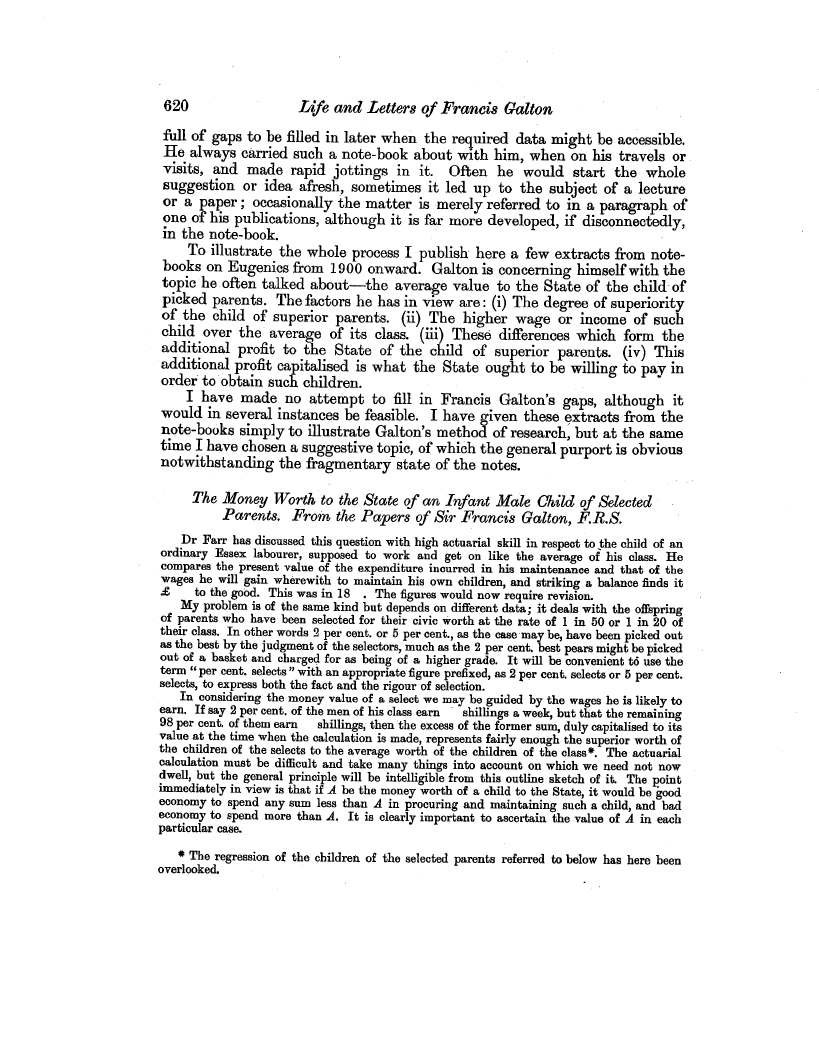| ||||||

OCR Rendition - approximate
620 Life and Letters of Francis Galton full of gaps to be filled in later when the required data might be accessible. He always carried such a note-book about with him, when on his travels or visits, and made rapid jottings in it. Often he would start the whole suggestion or idea afresh, sometimes it led up to the subject of a lecture or a paper ; occasionally the matter is merely referred to in a paragraph of one of his publications, although it is far more developed, if disconnectedly, in the note-book. To illustrate the whole process I publish here a few extracts from notebooks on Eugenics from 1900 onward. Galton is concerning himself with the topic he often talked about-the average value to the State of the child-of picked parents. The factors he has in view are : (i) The degree of superiority of the child of superior parents. (ii) The higher wage or income of such child over the average of its class. (iii) These differences which form the additional profit to the State of the child of superior parents. (iv) This additional profit capitalised is what the State ought to be willing to pay in order to obtain such children. I have made no attempt to fill in Francis Galton's gaps, although it would in several instances be feasible. I have given these extracts from the note-books simply to illustrate Galton's method of research, but at the same time I have chosen a suggestive topic, of which the general purport is obvious notwithstanding the fragmentary state of the notes. The Money Worth to the State of an Infant Male Child of Selected
Dr Farr has discussed this question with high actuarial skill in respect to the child of an ordinary Essex labourer, supposed to work and get on like the average of his class. He compares the present value of the expenditure incurred in his maintenance and that of the wages he will gain wherewith to maintain his own children, and striking a balance finds it £ to the good. This was in 18 . The figures would now require revision. My problem is of the same kind but depends on different data; it deals with the offspring of parents who have been selected for their civic worth at the rate of 1 in 50 or 1 in 20 of their class. In other words 2 per cent. or 5 per cent., as the case' may be, have been picked out as the best by the judgment of the selectors, much as the 2 per cent, best pears might be picked out of a basket and charged for as being of a higher grade. It will be convenient to use the term " per cent. selects " with an appropriate figure prefixed, as 2 per cent. selects or 5 per. cent. selects, to express both the fact and the rigour of selection. In considering the money value of a select we may be guided by the wages he is likely to earn. If say 2 per cent, of the men of his class earn shillings a week, but that the remaining 98 per cent. of them earn shillings, then the excess of the former sum, duly capitalised to its value at the time when the calculation is made, represents fairly enough the superior worth of the children of the selects to the average worth of the children of the class*. The actuarial calculation must be difficult and take many things into account on which we need not now dwell, but the general principle will be intelligible from this outline sketch of it. The point immediately in view is that if A be the money worth of a child to the State, it would be good economy to spend any sum less than A in procuring and maintaining such a child, and bad economy to spend more than A. It is clearly important to ascertain the value of A in each particular case. * The regression of the children of the selected parents referred to below has here been overlooked.
|